 Hardware Tutorial
Hardware Tutorial
 Hardware News
Hardware News
 Xiaomi Mi 14 series unveiled: Still the best configuration, photography is still the highlight
Xiaomi Mi 14 series unveiled: Still the best configuration, photography is still the highlight
Xiaomi Mi 14 series unveiled: Still the best configuration, photography is still the highlight
When it comes to which Android phone has been the most popular in the past year, Xiaolei will definitely vote for Xiaomi Mi 13. The reason is also very simple. The bucket-worthy configuration, rare small straight screen design and good system optimization make it It can be said to be "killing everyone" in the market at the same price range.
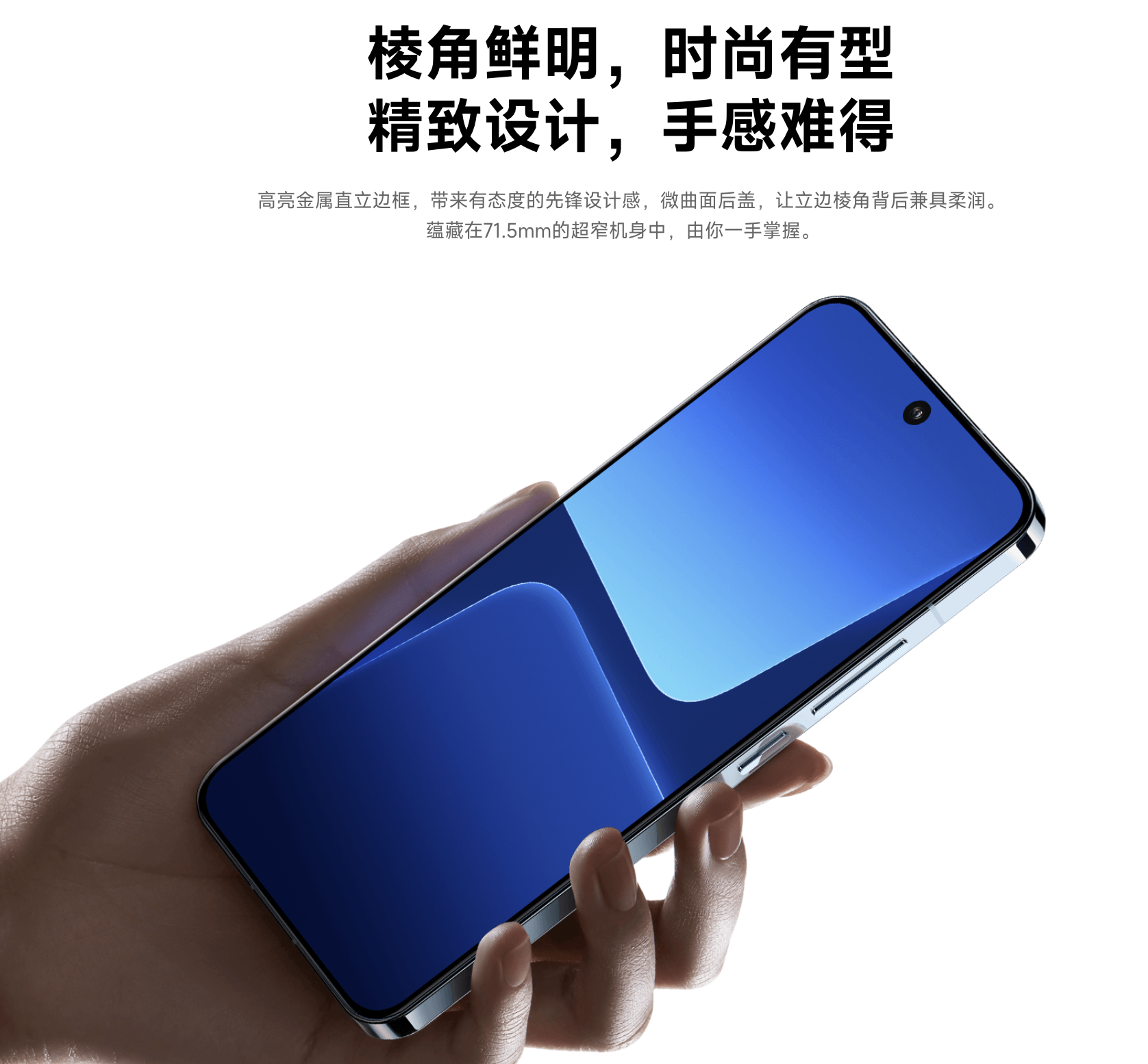
(Picture source: Xiaomi official website)
According to the well-known digital blogger @digital chat station, Xiaomi Mi 13 The sales of the series far exceeded expectations, and it took only nine months to complete the sales task for a whole year. In addition, according to relevant statistics, Xiaomi 13 sales reached 1.1 million in the first quarter of this year, and 700,000 in the second quarter. , with sales of more than 2 million units throughout its life cycle, it can be said to be one of the few "top players" in the Android mobile phone market.
But no matter what, with the arrival of the third generation Qualcomm Snapdragon 8 processor, the Xiaomi Mi 13 series should also usher in its iterative upgrade. So how can the Xiaomi Mi 14 series maintain this excellent performance? , or even achieve transcendence?
The configuration continues to be upgraded, but this is not enough
The configuration of Xiaomi’s digital series flagship can reassure the vast majority of consumers. Almost every generation has achieved the highest price in the same price range. Take Xiaomi Mi 13 as an example: the second-generation Snapdragon 8 processor, high-quality direct screen, good image combination, excellent feel and texture, and sufficient charging combination can satisfy most discerning consumers.
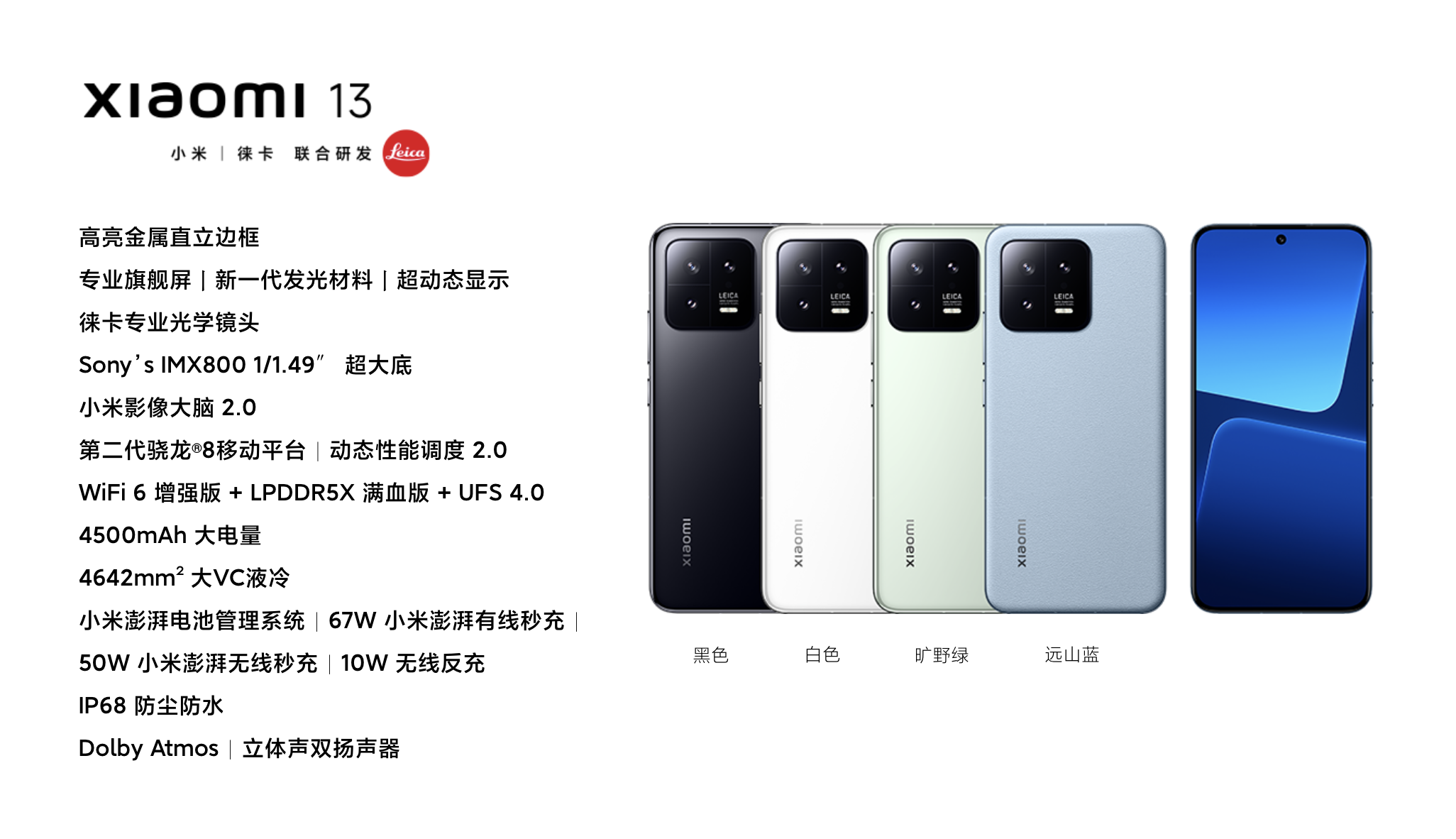
(Picture source: Xiaomi official website)
The Xiaomi Mi 14 series naturally continues this "excellent tradition" ” Needless to say about the processor, it must be the first batch of mobile phones equipped with the third-generation Snapdragon 8 processor. I won’t introduce too much about the specific performance of this processor here. Simply put, it is compared with the second-generation Snapdragon 8 processor. The power consumption of the Snapdragon 8 processor will decrease, but due to the manufacturing process, there should not be much improvement in performance.
As for the screen, the new Xiaomi Mi 14 will use a 1.5K direct screen, support 2880Hz high-frequency PWM dimming, and the peak brightness exceeds 2,600 nits. It is worth mentioning that the screen of Xiaomi Mi 14 is based on CSOT’s new technology. Thanks to this technology, the four-sided borders of Xiaomi Mi 14 can be controlled to about 1mm, which can be said to be the middle border among straight-screen mobile phones. One of the narrowest products ever. For users like Xiao Lei who like extremely narrow bezels, the front of Xiaomi Mi 14 will definitely attract me.
In terms of appearance, the Xiaomi Mi 14 series is roughly the same as the Xiaomi Mi 13 series. It has the same right-angled middle frame and square camera Deco. Although it does look somewhat similar to the iPhone, it can be regarded as Xiaomi’s signature in any case. Family style design. Coupled with the smaller screen size, Xiaomi Mi 14 should not disappoint us in terms of grip performance.
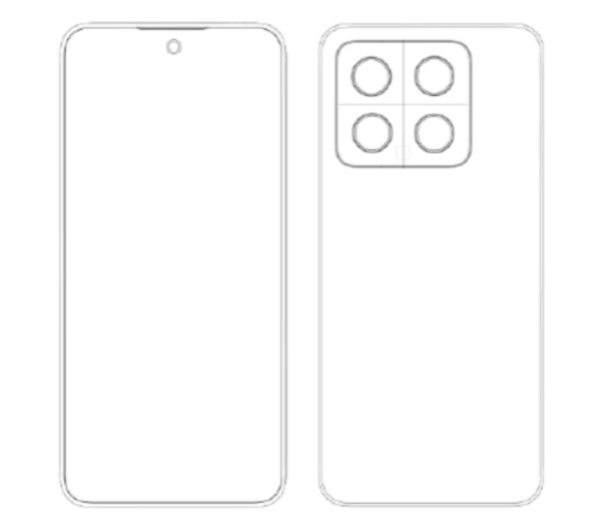
The Xiaomi Mi 14 Pro will have major changes in appearance. The screen will adopt the narrow-edge and slightly curved screen that is more mainstream today. It has a four-curved screen, and the curvature is greatly reduced, which can almost be said to be a straight screen. It seems that the development of mobile phones is also in a circle. Mobile phone manufacturers have gone round and round and returned to the straight-screen design.
In addition, according to relevant sources, Xiaomi Mi 14 Pro will use a titanium alloy version that is stronger and lighter, which coincides with the just-released iPhone 15 Pro series. The biggest advantage of titanium alloy material is that it can achieve the hardness of stainless steel with the weight of aluminum alloy, and at the same time, it is strong, thin and light, which greatly reduces the weight of flagship mobile phones. But the only problem is that the cost price of aluminum alloy is not low, which is likely to cause the price of Xiaomi Mi 14 Pro to increase.
The camera is considered a major upgrade of the Xiaomi Mi 14 series. According to reports, the rear specifications of the Xiaomi Mi 14 are 50MP super large bottom main camera (1/1.28 inches) 50MP (JN1) ultra-wide angle 50Mp upright telephoto JN1 3.2X optical zoom (1/2.76 inch) Leica triple camera, front 32MP (supports 4K recording).
Compared with the imaging specifications of Xiaomi Mi 13, Xiaomi Mi 14 has been significantly improved. The addition of a telephoto lens makes it incompetent in the face of higher-priced imaging flagships. If you look at the iPhone 15 series next door, it sells for more than 6,000 yuan. The telephoto lens is still cropped from the main camera. I have to lament that Apple users are really making money.
As for Xiaomi Mi 14 Pro, Xiaolei guesses that there is a high probability that it will still use the IMX989 sensor. This is also the top sensor on the market. There is no one. As long as Xiaomi can further tap its potential, I believe consumers will still use it. I am willing to accept the operation of the third generation without changing the main camera. As for the wide-angle and periscope telephoto lenses, they will also be upgraded accordingly, but the magnitude should not be significant. After all, they have to make way for the Ultra that will be released next year.
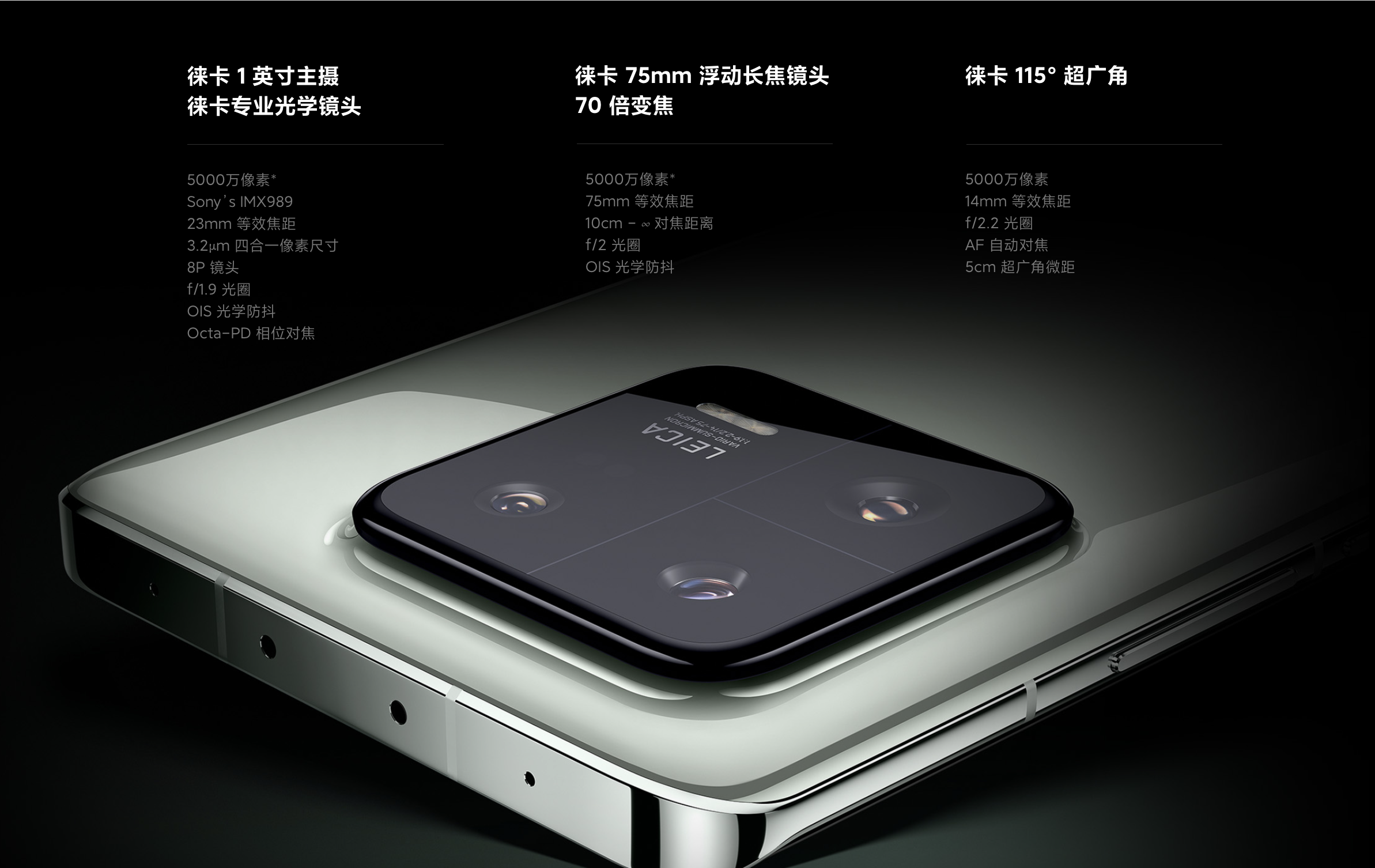
(Photo source: Xiaomi official website)
In addition, relevant sources revealed that the Xiaomi Mi 14 series has also been upgraded in terms of optical coating. The new optical coating can effectively control the transmittance of light and greatly reduce the effects of glare and ghosting. This upgrade can effectively avoid irreversible damage to the coating caused by environmental factors, ensuring stable and excellent optical performance.
In addition, small configurations such as starting with 12G storage and 90W wired fast charging will not be explained one by one here, but what is certain is that Xiaomi 14 will still be one of the few small-screen bucket flagships on the market. , although the sales volume may not reach the success of Xiaomi Mi 13, but if it can persist, it will gain a large number of loyal users.
Huawei and Apple are encircling and suppressing, Xiaomi’s high-end road is blocked?
But does strong product strength mean that Xiaomi’s high-end road will be smooth? In fact, it is not the case. With the return of Huawei Mate60 series, the mobile phone market has also ushered in a major reshuffle. If the previous Mate50 series and P60 series were to stabilize the hearts of Huawei users, then the emergence of the Mate 60 series undoubtedly gave Huawei users a shot in the arm, and also made Xiaomi, OPPO, vivo, Apple and other manufacturers feel... A hint of danger, after all, Huawei's position in the high-end market is obvious.
Not to mention that Huawei’s pricing this year is more affordable. The price starting from 5,999 yuan can not only compete with the iPhone 15 series, but also surpass the Xiaomi OV. It can be said to be a very reasonable and somewhat "cautious" product. of pricing. So for Xiaomi, how much impact will the return of Huawei's flagship have?

(Photo source: Huawei official website)
Huawei is in high-end mobile phones There is no doubt about the appeal of the market. It can be seen from the extremely high popularity in recent times that the market's expectations for Huawei are extremely huge, which will also weaken Xiaomi's attention in the high-end mobile phone market in disguise.
Of course, the return of Huawei’s 5G flagship will not only affect domestic manufacturers, Apple’s market share will also be affected. Judging from Apple’s sales strategy in the past two years , once Apple feels that its sales will decline, it will launch various preferential policies. There was even a wave of official price cuts for the iPhone 14 series last year, which was the first time in the history of the iPhone. As for this year's iPhone 15 series, Xiao Lei speculates that Apple will repeat its old tricks to make the iPhone more competitive in terms of price, and Xiaomi OV will be affected again.
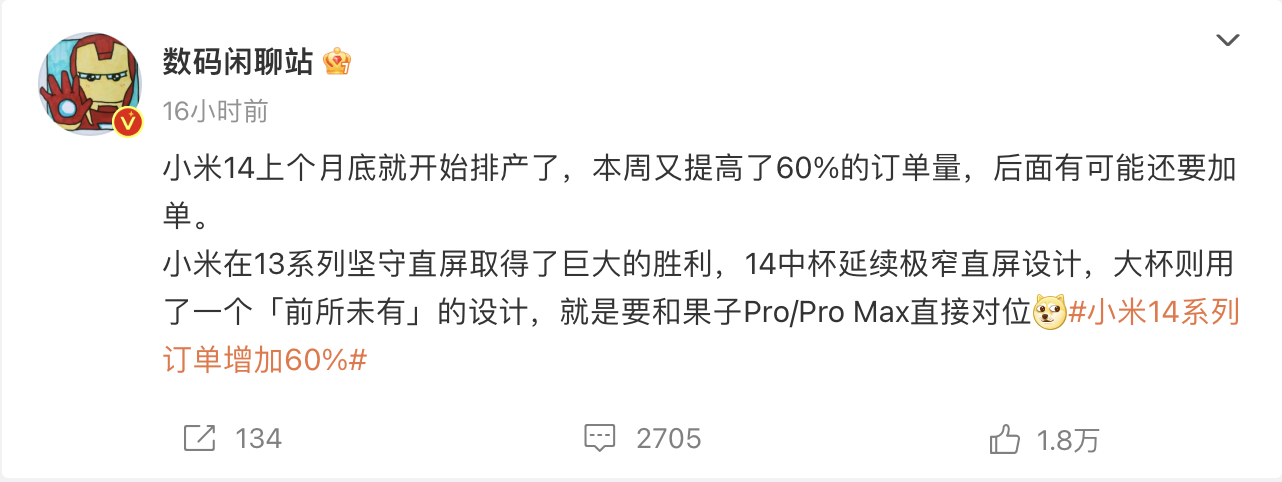
(Photo source: Weibo@digitalchatstation)
What Xiaomi has to do is both simple and difficult, which is to continue to adhere to its high-end strategy. Although Huawei's return will indeed have an impact, as long as Xiaomi can leave a good impression on consumers for multiple generations, I believe that the subsequent Xiaomi Mi 15 , 16 series will become the masterpiece among domestic mobile phones.
Generally speaking, Xiaomi Mi 14 series may not bring us the same eye-catching feeling as Mi Mi 12 and Mi Mi 13, but a steady and steady upgrade strategy can also effectively improve User recognition of Xiaomi. At that time, Lei Technology will also bring you relevant evaluation articles of the Xiaomi Mi 14 series as soon as possible, so stay tuned.
The above is the detailed content of Xiaomi Mi 14 series unveiled: Still the best configuration, photography is still the highlight. For more information, please follow other related articles on the PHP Chinese website!

Hot AI Tools

Undresser.AI Undress
AI-powered app for creating realistic nude photos

AI Clothes Remover
Online AI tool for removing clothes from photos.

Undress AI Tool
Undress images for free

Clothoff.io
AI clothes remover

AI Hentai Generator
Generate AI Hentai for free.

Hot Article

Hot Tools

Notepad++7.3.1
Easy-to-use and free code editor

SublimeText3 Chinese version
Chinese version, very easy to use

Zend Studio 13.0.1
Powerful PHP integrated development environment

Dreamweaver CS6
Visual web development tools

SublimeText3 Mac version
God-level code editing software (SublimeText3)

Hot Topics
 Apple and Huawei both wanted to make a buttonless phone, but Xiaomi made it first?
Aug 29, 2024 pm 03:33 PM
Apple and Huawei both wanted to make a buttonless phone, but Xiaomi made it first?
Aug 29, 2024 pm 03:33 PM
According to a report from Smartprix, Xiaomi is developing a buttonless mobile phone codenamed "Suzaku". According to this news, this mobile phone codenamed Zhuque will be designed with an integrated concept, use an under-screen camera, and be equipped with Qualcomm Snapdragon 8gen4 processor. If the plan does not change, we are likely to see its arrival in 2025. When I saw this news, I thought I was back in 2019 - at that time, Xiaomi released the Mi MIX Alpha concept phone, and the surround-screen button-less design was quite amazing. This is the first time I have seen the charm of a buttonless mobile phone. If you want a piece of "magic glass", you must first kill the buttons. In "The Biography of Steve Jobs", Jobs once expressed that he hoped that the mobile phone could be like a piece of "magic glass".
 Long awaited! Xiaomi MIX Flip upgrade adds Mijia App external screen display function
Aug 20, 2024 pm 09:39 PM
Long awaited! Xiaomi MIX Flip upgrade adds Mijia App external screen display function
Aug 20, 2024 pm 09:39 PM
According to news on August 20, today, Xiaomi ThePaper OS officially announced an important update. Mijia App now supports external screen display on Xiaomi MIX Flip. To enable this feature, users only need to upgrade Mijia App to version V9.7.701 and above, and then add Mijia App in phone settings-external screen-external screen application. After opening the app, users can view supported devices in "My Home" directly on the external screen and quickly adjust the device status. In addition to the Mijia App, fenye's English learning software app also supports the external screen display of Xiaomi MIX Flip and can be directly switched to the internal screen for use. Xiaomi MIXFlip release date: July 19 Processor: Snapdragon 8Gen3 internal screen
 Xiaomi 15 series full codenames revealed: Dada, Haotian, Xuanyuan
Aug 22, 2024 pm 06:47 PM
Xiaomi 15 series full codenames revealed: Dada, Haotian, Xuanyuan
Aug 22, 2024 pm 06:47 PM
The Xiaomi Mi 15 series is expected to be officially released in October, and its full series codenames have been exposed in the foreign media MiCode code base. Among them, the flagship Xiaomi Mi 15 Ultra is codenamed "Xuanyuan" (meaning "Xuanyuan"). This name comes from the Yellow Emperor in Chinese mythology, which symbolizes nobility. Xiaomi 15 is codenamed "Dada", while Xiaomi 15Pro is named "Haotian" (meaning "Haotian"). The internal code name of Xiaomi Mi 15S Pro is "dijun", which alludes to Emperor Jun, the creator god of "The Classic of Mountains and Seas". Xiaomi 15Ultra series covers
 The first 1.5K under-screen camera! Nubia Z70 Ultra is here: the world's first Snapdragon 8 Gen4 true full-screen phone
Aug 19, 2024 pm 03:47 PM
The first 1.5K under-screen camera! Nubia Z70 Ultra is here: the world's first Snapdragon 8 Gen4 true full-screen phone
Aug 19, 2024 pm 03:47 PM
According to news on August 19, Nubia has been adhering to the true full-screen design since the release of Z50 Ultra, and has been continuously exploring the field of proactive photography under high-pixel screens. Today, digital blogger Wisdom Pikachu broke the news that the Nubia Z70 Ultra, which will be released in the second half of this year, will debut with 1.5K under-screen camera technology, which is the highest-resolution UDC solution in the industry so far. It is reported that ZTE’s under-screen proactive solution has advanced to the sixth generation. The latest under-screen proactive solution is available in the Nubia Z60 Ultra and Red Magic 9S Pro series. The screen resolution is 2480x1116, which is between 1080P and 1.5K resolution. This time Nubia will break through the limitations of existing resolutions and set a new benchmark in the industry.
 A new generation of thousand-yuan magic machine! Redmi Note 14 series joins the Internet: supports up to 90W fast charging
Sep 02, 2024 pm 12:44 PM
A new generation of thousand-yuan magic machine! Redmi Note 14 series joins the Internet: supports up to 90W fast charging
Sep 02, 2024 pm 12:44 PM
According to news on September 2, three new models of the Redmi Note14 series have been launched on the Internet, supporting up to 90W fast charging. According to various sources, this series will be released this month, focusing on the thousand-yuan market. 1. There are three models in the series, including RedmiNote14, RedmiNote14Pro and RedmiNote14Pro+. They are respectively equipped with Qualcomm Snapdragon 7sGen3, Dimensity 7350, and second-generation Snapdragon 7s. The Redmi Note14Pro series uses a 1.5K curved screen. This is Redmi’s first curved screen model this year and is consistent with the screen form of the previous generation Note13Pro+. RedmiNote14Pro series appearance: large-area centered three-camera solution camera Deco
 Realme GT7 Pro is full of products: ultrasonic fingerprint, super large battery, and 100W fast charging are all listed
Aug 23, 2024 pm 03:31 PM
Realme GT7 Pro is full of products: ultrasonic fingerprint, super large battery, and 100W fast charging are all listed
Aug 23, 2024 pm 03:31 PM
According to news on August 23, according to digital bloggers Digital Chat Station, the product capabilities of the Realme GT7 Pro will be comprehensively strengthened, and its configuration will cover ultrasonic fingerprints, periscope telephoto, ultra-large batteries, and 100-watt fast charging. 1. Realme GT7Pro has a built-in large 6000mAh battery and supports 100W fast charging. The engineering machine does not support wireless charging, and the mass production model is unknown. Equipped with single-point ultrasonic fingerprint recognition and supports IP68/69 dustproof and waterproof. Equipped with LYT6003X periscope, it does not support telephoto macro. Equipped with a 1.5K resolution equal depth four-curved screen, using BOE X2 substrate. It uses the Snapdragon 8Gen4 processor and supports up to 16GB of memory and 1TB of storage. The Realme GT7Pro is expected to be launched as soon as Q4 this year.
 The price of Mate 60 is reduced by 800 yuan, and the price of Pura 70 is reduced by 1,000 yuan: Just wait until Huawei releases Mate 70!
Aug 16, 2024 pm 03:45 PM
The price of Mate 60 is reduced by 800 yuan, and the price of Pura 70 is reduced by 1,000 yuan: Just wait until Huawei releases Mate 70!
Aug 16, 2024 pm 03:45 PM
According to news on August 16, for current Huawei mobile phones, they are already working hard to clear the way for the launch of new models, so everyone has seen the prices of the Mate60 series and Pura70 series being reduced one after another. With Huawei officially announcing price cuts for the Mate60 series on August 15, the latest models of Huawei’s two flagship series have completed price adjustments. In July this year, Huawei officially announced that the Huawei Pura70 series would be on sale, with prices reduced by up to 1,000 yuan. Among them, Huawei Pura70 has a direct discount of 500 yuan, with a starting price of 4999 yuan; Huawei Pura70 Beidou Satellite News Edition has a direct discount of 500 yuan, with a starting price of 5099 yuan; Huawei Pura70Pro has a direct discount of 800 yuan, with a starting price of 5699 yuan; Huawei Pura70Pr
 Xiaomi Redmi 14C mobile phone revealed to be released on August 31: 6.88-inch 90Hz screen, 5160mAh battery, 50MP main camera
Aug 24, 2024 am 11:07 AM
Xiaomi Redmi 14C mobile phone revealed to be released on August 31: 6.88-inch 90Hz screen, 5160mAh battery, 50MP main camera
Aug 24, 2024 am 11:07 AM
According to news on August 24, technology media 91Mobile published a blog post yesterday (August 23), breaking the news that Xiaomi will release the Redmi14C smartphone on August 31, which will be available in three colors: green (should be plain leather), black and blue. Xiaomi Redmi14C is equipped with an Oreo circular camera module on the back, equipped with 2 camera sensors and 1 LED flash, 50-megapixel main camera, and the volume and power buttons are on the right side. Attached is the promotional picture of Xiaomi Redmi14C as follows. You can see that the front is equipped with a water drop-shaped groove. Since the product is positioned at the mid-to-low end, the frame on the chin part is wider. In terms of specifications, Xiaomi Redmi14C mobile phone is equipped with a 6.88-inch FullHD+ resolution screen with a refresh rate of 90H





